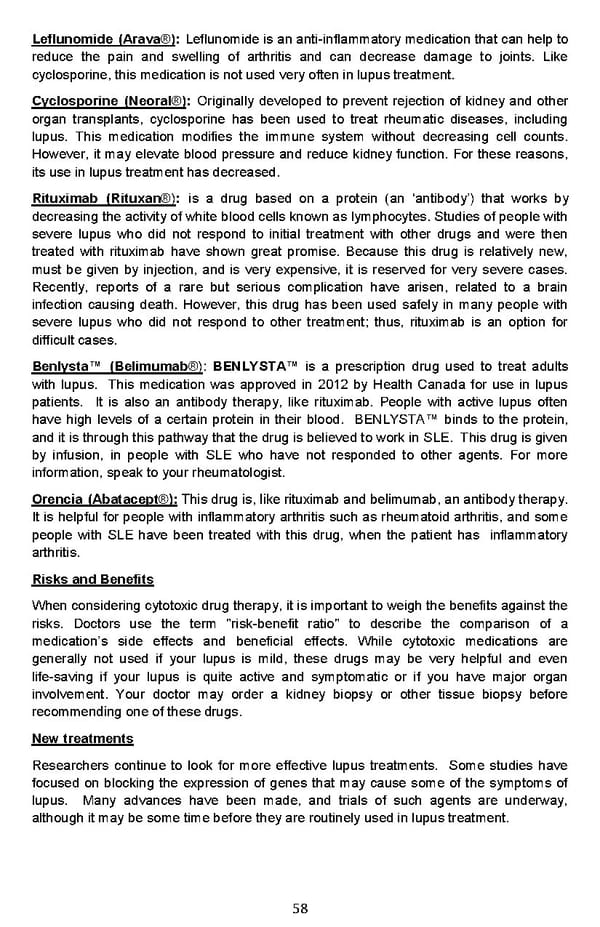Leflunomide (Arava®): Leflunomide is an anti-inflammatory medication that can help to reduce the pain and swelling of arthritis and can decrease damage to joints. Like cyclosporine, this medication is not used very often in lupus treatment. Cyclosporine (Neoral®): Originally developed to prevent rejection of kidney and other organ transplants, cyclosporine has been used to treat rheumatic diseases, including lupus. This medication modifies the immune system without decreasing cell counts. However, it may elevate blood pressure and reduce kidney function. For these reasons, its use in lupus treatment has decreased. Rituximab (Rituxan®): is a drug based on a protein (an ‘antibody’) that works by decreasing the activity of white blood cells known as lymphocytes. Studies of people with severe lupus who did not respond to initial treatment with other drugs and were then treated with rituximab have shown great promise. Because this drug is relatively new, must be given by injection, and is very expensive, it is reserved for very severe cases. Recently, reports of a rare but serious complication have arisen, related to a brain infection causing death. However, this drug has been used safely in many people with severe lupus who did not respond to other treatment; thus, rituximab is an option for difficult cases. Benlysta™ (Belimumab®): BENLYSTA™ is a prescription drug used to treat adults with lupus. This medication was approved in 2012 by Health Canada for use in lupus patients. It is also an antibody therapy, like rituximab. People with active lupus often have high levels of a certain protein in their blood. BENLYSTA™ binds to the protein, and it is through this pathway that the drug is believed to work in SLE. This drug is given by infusion, in people with SLE who have not responded to other agents. For more information, speak to your rheumatologist. Orencia (Abatacept®): This drug is, like rituximab and belimumab, an antibody therapy. It is helpful for people with inflammatory arthritis such as rheumatoid arthritis, and some people with SLE have been treated with this drug, when the patient has inflammatory arthritis. Risks and Benefits When considering cytotoxic drug therapy, it is important to weigh the benefits against the risks. Doctors use the term "risk-benefit ratio" to describe the comparison of a medication’s side effects and beneficial effects. While cytotoxic medications are generally not used if your lupus is mild, these drugs may be very helpful and even life-saving if your lupus is quite active and symptomatic or if you have major organ involvement. Your doctor may order a kidney biopsy or other tissue biopsy before recommending one of these drugs. New treatments Researchers continue to look for more effective lupus treatments. Some studies have focused on blocking the expression of genes that may cause some of the symptoms of lupus. Many advances have been made, and trials of such agents are underway, although it may be some time before they are routinely used in lupus treatment. 58
 Living Well With Lupus Facts Booklet Page 57 Page 59
Living Well With Lupus Facts Booklet Page 57 Page 59